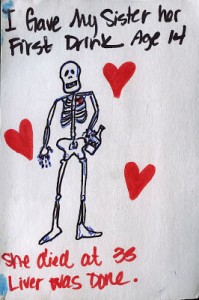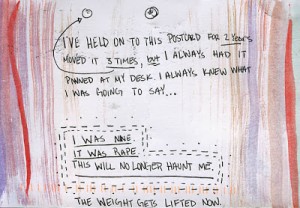Regret, Relief and Confession
I was looking at PostSecret today and I noticed these two secrets that were posted:
These two posts made me stop and freeze in my tracks. I’ve had to look at PostSecret for my presentation, but these two just jumped out at me for the raw honesty in these people’s mini autobiographies. They talk about horrible things that have happened to them, but don’t at all filter it. It presents us with a shock value that makes us sit up straight and think about PostSecret. This is what I’m doing.
Both these posts show how regret can tear you up. In the first case, regret of your past events and in the second, regret for being silent. We can see from this that PostSecret allows for people to post and share the things they wish never happened. Instead of bottling it up, they post online and they have to deal with it. Look at the example of the second postcard. This person had held onto the card for 2 years, before they sent it in. However, once they did they felt free. This goes back directly to a quote that Frank Warren, the founder of PostSecret said.
You will find your answers in the secrets of strangers. – Frank Warren
By posting online this person was able to feel free. However, we don’t know if author of the first postcard felt free after sending in their secret. The contrast between the horrible message and the cartoony images seems to imply a sort of self-deprecating regret that exemplifies the author’s inner turmoil. One tool that PostSecret uses which is not part of the official website is a discussion board. On it, people can communicate and discuss and provide help for those who are suffering. So while we might not be able to tell how the person felt after submitting their secret, we can show that there is an alternate forum for them to come to peace if they so choose.
PostSecret is interesting because it presents a platform where the viewer can observe the unguarded lives of people. The cyclical humour of the first post, paired with the tragedy yet comforting second posts show us where postsecrets can start, but how every person’s journey to resolution is different. For both people, the act of sending away their secrets let them come to some sort of conclusion. For the first person it’s the fact that now that it is on the web they have to deal with their regret and sadness. For the other is that now they are unburdened by their sadness and it leads to their relief. Relief in moving on and having a new life.
PostSecret’s like these leave me uncomfortable. Perhaps it is the private nature of our society has socialized me to be weary of such unguarded emotion. A downfall of PostSecret is that there isn’t much I can do when I learn about these peoples suffering. As humans we want to fix problems, but with PostSecret their isn’t much we can do besides posting words of sympathy on a discussion forum.
There is a sort of burden that we as viewers take on. A burden of a witness that see’s what is happening, but can do nothing to stop it. We can compare this to the TRC. Horrible things happened to Native Canadians and so out of respect and dignity we listen to their sorrows. As witnesses of tragedy we often have feelings of despair. We want to make the world a fixable place, but it is not. So the best we can do are things like the “International Suicide Prevention Program” and the TRC that allow is to help, but not fix people.
By celebrating and becoming the culture of confession, we have a role to play as witness and that is helping people. That may be implied through invisible people on PostSecret sympathizing with someone or directly as providing advice for people on the forum. Whatever it is as witnesses we have roles to play in regret, relief and confession.


